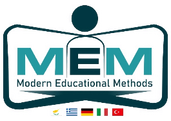Nowadays, the digital advancement has lead into a new era, where low-skilled adults tend to be left behind, or fall into technological “traps” younger generations born “entwined” with technology can easily avoid. Digital illiteracy raises other obstacles to adults, be they in their everyday life or their work and social environment.
Moreover, it is commonly acknowledged that adults tend to shun the educational proccess as it is a common belief that the time for “attending school” has long passed, and a significant number of those who take the first steps towards enhancing their skillset via education drop out early for various reasons, including lack of motivation, skills difficulties and false expectations on the course (DIDO 2017 results). Al the while, the ammount of advertisments and newsfeeds is unprecedented and critical thinking is commonly acknowledged as one of the necessary skills of the 21st century.
Adult Trainers and Adult Education Stakeholders are in a constant battle to attract adults and combat the skills gap between generations. While there is a plethora of potential attracting solutions, such as portraying market needs and displaying the benefits of gaining skills necessary to the labor market and the 21st century daily life, Adult Trainers and Stakeholders also face the need to keep the trainees’ interest peaked throughout the learning proccess, in order to maintain the group’s focus and increase absorption of information during the session.
It is also commonly accepted that the traditional teaching methods and student-teacher relationship is not as effective as it used to be prior to the age of technology, and students (especially adults) quickly lose interest in sessions being held under that learning model. Thus, it is imperative for the Adult Education proccess to be conducted in modern and innovative ways, using modern techniques which include more critical thinking and understanding over memorizing and assimilating information, and which take advantage of the techology at hand.
The objective of this project is to conduct a serries of Training Activities, where the involved institutes will be able to share the educational methods/tools they use with one another, and be able to locate the differences and benefits of integrating each methodology/tool in their own proccesses.
The partners will each task 3 adult trainers related to their institutions to attend the LTTAs, and
understand/discuss the proccesses suggested by the host partner organizations, such as
-Game Based Learning (5-day activity)
-Critical Thinking and Information Filtering (5-day activity)
-Augmented Reality in the Classroom (5-day activity)
The target groups regarding this project are: Adult Education Trainers, who will be able to share experiences and upgrade their skillset, Adult Education Stakeholders who will benefit from the enhanced skillset of the Trainers, and finally Adults wanting to learn and catch up to 21st century skills.
In general, the expected outcomes of the project for the organizations are:
-Increase the Trainer skill set on Game Based Learning
-Increase the Trainer skill set on Critical Thinking and Information Filtering
-Increase the Trainer skill set on Augmented Reality
-Power Point presentations of the context of each LTTA
-Present the results of satisfaction questionnaires
The expected results of the project’s activities for the participants are summarized as they will:
-be able to use Augmented Reality apps for educational purposes
-be able to understand & apply key concepts in logical and critical thinking
-be able to apply logic trees (decision trees)
-Use GBL and integrate it in their sessions
-Design their sessions based on GBL
-obtain a better understanding and respect for the cultural diversity within the EU
-understand more clearly their european identity
The project has a detailed management plan in effect including 4 TPMs, where the main focus is the qualitative preparation of the participants, the activities and the dissemination activities. Dissemination for the project will occur in often intervals to achieve the maximum impact and keep the target groups’ interest of the project peaked.
The potential impact is expected to reach a minimum of 1.000 Adult Trainers via the dissemination activities of the project and the dissemination of the associated partners of each participating organization. Of course, locally the participants will greatly add to the dissemination via telling of their experience.
The participants and through them and the internal dissemination actions their peers and the organizations will greatly benefit in the long-term as the enhanced skill set of the Adult Trainers will have an added value to the organizations’ prestige. The organizations will be able to create courses of increased value, and be able to attract Adult Learners via the new educational methods. The Adult Learns will also clearly benefit and increase their modern day skill sets.
-
Results:




